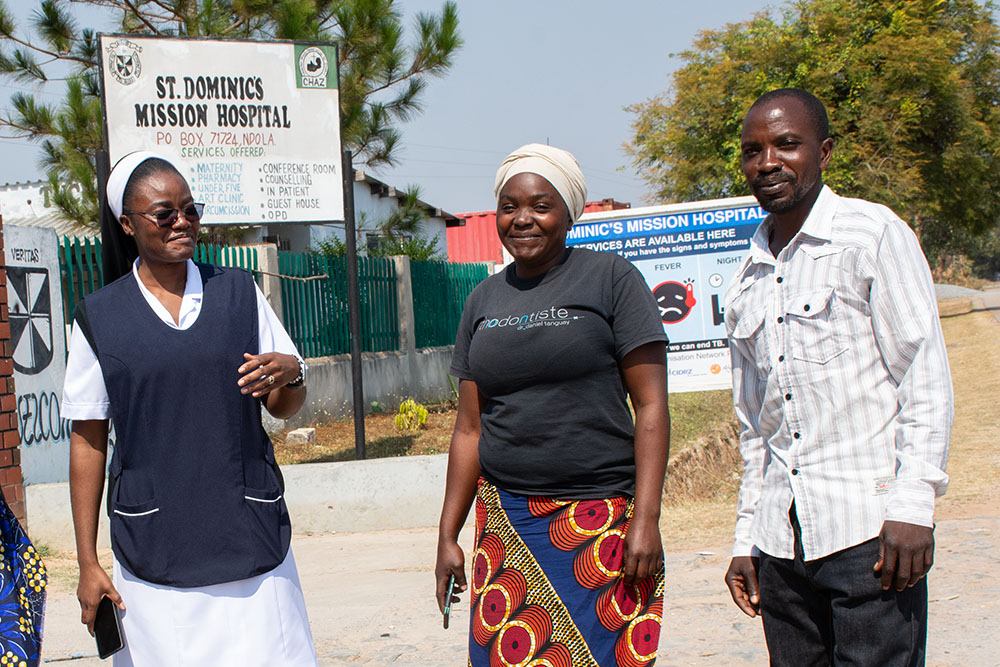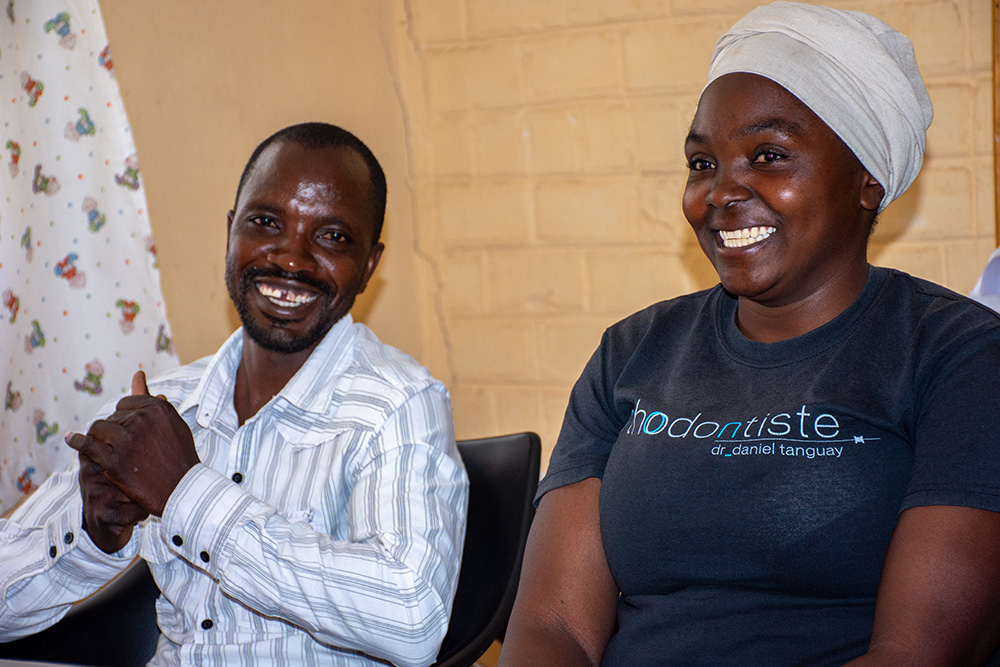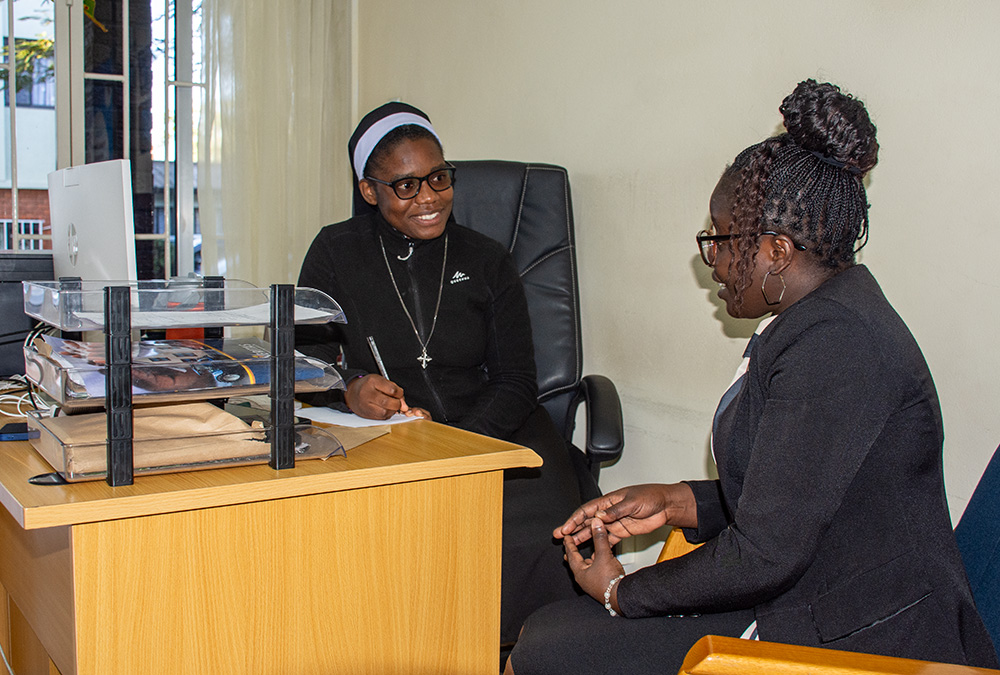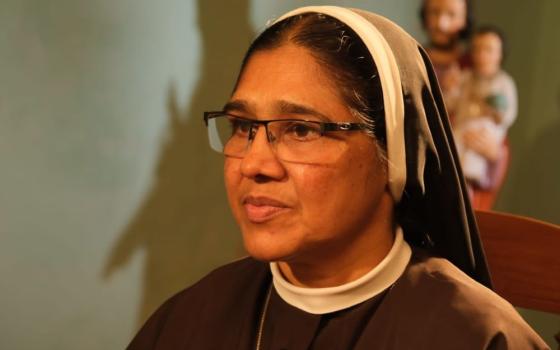
From left: Sr. Maureen Mofu, and Roiness and Aaron Chimfwembe at St. Dominic's Mission Hospital in Ndola, Zambia. The Chimfwembes participate in the SMART Couples Methodology program, facilitated by the Dominican Sisters of the Sacred Heart under the Ndola Diocese. (GSR photo/Derrick Silimina)
Editor's note: This story is part of Global Sisters Report's yearlong series, "Out of the Shadows: Confronting Violence Against Women," which will focus on the ways Catholic sisters are responding to this global phenomenon.

(GSR logo/Olivia Bardo)
In the heart of Ndola's industrial area, a convoy of trucks enters a factory while workers operate forklifts, moving back and forth to load boxes of raw materials onto trucks.
Joel Kabwe recalls how the stress he experienced due to his failing marriage to Anna Kabwe affected his focus while supervising loading operations here, 319 km north of Lusaka, Zambia's capital.
"I opted for binge drinking beer as a way to seek solace and manage frustrations that often lead to domestic conflicts, but that exacerbated our relationship problems," Kabwe told Global Sisters Report.
Kabwe, a resident of Twapia township in Ndola, emphasized that his ability to concentrate on his responsibilities was impacted, which negatively affected his work output and contributions to his family's welfare.
Kabwe's story exemplifies a common challenge faced by many young couples in Zambia, where issues of mistrust often complicate marriage realities. His experience highlights the broader societal and relational difficulties that can hinder marital harmony among youth in this mining town.
Despite concerted efforts to curb gender-based violence in Zambia, the latest government report shows more than 10,000 incidents recorded in just the second quarter of 2025. This reflects the deep-rooted influence of harmful gender stereotypes, patriarchal norms, economic inequalities and inadequate legal protections in the country.
Advertisement
Gender activists say these factors contribute to a culture where violence against women is normalized and often goes unchallenged, hence the need for comprehensive interventions that challenge these social norms and strengthen legal and community responses to gender-based violence.
Similarly, the experience of Aaron and Roiness Chimfwembe from Ndola's Kavu area illustrates that even long-lasting marriages, like their 10-year union built on mutual affection, face challenges.
"The major issue in our relationship was Aaron's secrecy regarding his phone, which was always password protected and I had no access to it. This secrecy contributed to our growing insecurities over time," Roiness told GSR.
In October 2023, Roiness persuaded her husband to enroll in the SMART Couples Methodology program, facilitated by the Dominican Sisters of the Sacred Heart under the Ndola Diocese. The initiative, which has successfully served more than 20 couples in Ndola, is part of ongoing efforts by the U.S. church's Catholic Relief Services to strengthen family life and enhance communication within households by overcoming mistrust and fostering openness, honesty and mutual respect between partners.
Roiness told GSR that the couple's understanding of the importance of transparency and openness was strengthened through the program as was their renewed trust. Aaron, after an impactful session, decided to remove the password from his phone and directly handed it to her, saying, "I trust you completely, and I want you to know that there's nothing I'm hiding."

Aaron and Roiness Chimfwembe at a SMART Couple Methodology counseling session (GSR photo/Derrick Silimina)
For Roiness, Aaron's gesture was a significant turning point in their relationship, symbolizing a deepening of trust and honesty, as it was not merely about accessing Aaron's phone, but his commitment to fidelity and transparency.
Geoffrey Chibamba and Mwansa Musonda's marriage was recently at the verge of collapse, but was revived thanks to the SMART Couples Methodology.
"Had it not been the sisters' timely initiative, I would have divorced my husband. But after our participation in the programme, our love life has now blossomed," Musonda said.
Musonda was so moved by the sisters' initiative, that she became one of the "lead mothers" of the project in her community.
"Our quarrels used to affect our children's upbringing and I became hostile to my husband's relatives. Thanks to the sisters' timely project for saving our marriage."
The high rates of divorce cases in the country have led to concern among government officials and religious leaders. The latest reports indicate a rise from 20,818 divorces in 2019 to 36,000 in 2023. Infidelity and drunkenness are frequently cited as major reasons for these separations.
The SMART Couples Methodology project coordinator, Sr. Christine Tembo, emphasized that the initiative involves offering formation sessions, couples counseling, home visits, and organizing community sensitization activities that encourage mutual love, respect, and Christian family values. These are essential components in preventing gender-based violence and divorce cases, Tembo noted.

Dominican Sr. Christine Tembo speaks to one of her clients ahead of a SMART Couple Methodology counseling session. (GSR photo/Derrick Silimina)
Tembo, a member of the Dominican Sisters of the Sacred Heart, told GSR that since the program was introduced in 2023, more than 20 couples have directly benefited from the sessions and follow-up support. These include both churchgoing and non-church couples who have expressed a genuine desire to grow in their relationships.
"Our main focus is strengthening young couples that are still giving birth, because we are also targeting the children in those homes, so that they can be brought up in a good home," she added.
Tembo measured the impact of the project through post-session evaluations, testimonies, follow-up visits, and feedback from the couples themselves and community members in general.
She expressed optimism that despite some challenges, including limited resources, resistance to change, and cultural barriers that silence victims of abuse, more than seven documented success stories of couples have since chosen to remain together and rebuild their marriages after facing serious domestic conflicts.
Tembo underscored that by engaging community leaders, offering continuous formation, and networking with local nongovernmental organizations and churches for support through prayer and patience are also key in helping hearts open to transformation.
"So far, we have seen improved communication, renewed commitment among couples, and decreased reports of domestic conflicts in households that have undergone the training. We are on track with our goals of building strong, faith-filled and resilient families," Tembo said.
She stressed that the program has contributed to the couples' well-being by helping them to rediscover each other as partners, and not as opponents, preventing gender-based violence by addressing its root causes of poor communication, unresolved conflict and gender stereotypes.
"As a Dominican, I am called to preach the truth and promote the dignity of all people. The SMART Couples Methodology is a concrete expression of this charism — bringing healing, reconciliation and hope to families, while empowering them to live in truth and love."






